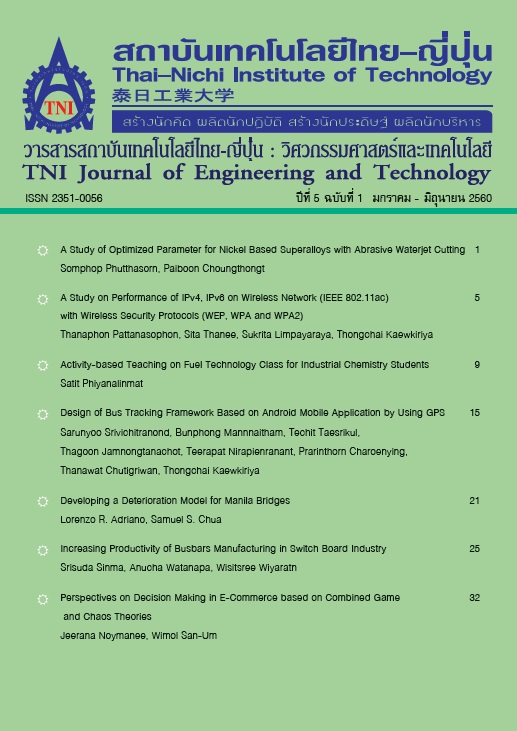Activity-based Teaching on Fuel Technology Class for Industrial Chemistry Students
Main Article Content
Abstract
The research aimed to improve the students’ engagement on Fuel technology class 209331 by using various activities in the classroom and on internet. It included the field trip at Biogas production plant. The previous teaching consisted of 80% lecturing with 20% report. By using the same content by activity-based teaching, it was divided into 3 main sections. It consisted of group presentation, filed trip and CMU moodle on the internet. It could decrease the lecturing time to 20% with the activities to 80%. This followed teach less, learn more. The new teaching was evaluated by 4 sections: student participation, learning behavior, motivation and attitude using statistical analysis. Based on the highest score of 3 from assessment, the student participation and learning behaviour, they obtained the average scores of 2.08 and 2.38, espectively. Compared to the highest score of 5, they got the average score of 4.10 and 4.26 for the student motivation and attitude, respectively. The results showed that the activitied-based teaching- new teaching, it increased the students’ attention to class and their participation using E-mail and social networking to search the related knowledge. Additionally, the students accepted the different ideas of their classmate and learnt extensively from class presentation. The student motivation improved self-development and with the positive attitude to learn new activities. They finally become the active learners by the activity-based teaching to follow 21st Century skill.
Article Details
Article Accepting Policy
The editorial board of Thai-Nichi Institute of Technology is pleased to receive articles from lecturers and experts in the fields of engineering and technology written in Thai or English. The academic work submitted for publication must not be published in any other publication before and must not be under consideration of other journal submissions. Therefore, those interested in participating in the dissemination of work and knowledge can submit their article to the editorial board for further submission to the screening committee to consider publishing in the journal. The articles that can be published include solely research articles. Interested persons can prepare their articles by reviewing recommendations for article authors.
Copyright infringement is solely the responsibility of the author(s) of the article. Articles that have been published must be screened and reviewed for quality from qualified experts approved by the editorial board.
The text that appears within each article published in this research journal is a personal opinion of each author, nothing related to Thai-Nichi Institute of Technology, and other faculty members in the institution in any way. Responsibilities and accuracy for the content of each article are owned by each author. If there is any mistake, each author will be responsible for his/her own article(s).
The editorial board reserves the right not to bring any content, views or comments of articles in the Journal of Thai-Nichi Institute of Technology to publish before receiving permission from the authorized author(s) in writing. The published work is the copyright of the Journal of Thai-Nichi Institute of Technology.
References
L. B. Abbott, K. L. Launchbaugh, and S. Edinger-Marshall, “Range Education in the 21st Century: Striking the Balance to Maintain a Relevant Profession,” Rangeland Ecology & Management, vol. 65, no. 6, pp. 647–653, Nov. 2012.
R. F. Lim, B. C. Hsiung, and D. J. Hales, “Lifelong Learning: Skills and Online Resources,” Acad Psychiatry, vol. 30, no. 6, pp. 540–547, Nov. 2006.
W. B. Whalley, A. Saunders, R. A. Lewis, M. Buenemann and P. C. Sutton, “Curriculum Development: Producing Geographers for the 21st Century," Journal of Geography in Higher Education, vol.35, pp. 379-393, 2011.
J. Turns, R. Adams, A. Linse, J. Martin, and C. J. Atman, “Bridging from research to teaching in undergraduate engineering design education,” International Journal of Engineering Education, vol. 20, no. 3, pp. 379–390, 2004.
J. P. Morton, “Learning to be a sport and exercise 'scientist': evaluations and reflections on laboratory-based learning and assessment,” Journal of Hospitality Leisure Sport & Tourism Education, vol. 7, issue. 2, pp. 93-100, Nov.2008.
L. Eisen, N. Marano, and S. Glazier, “Addition to Activity-Based Approach For Teaching Aqueous Solubility, Energy, and Entropy,” J. Chem. Educ., vol. 91, no. 8, pp. 484-491, Aug. 2014.
A. E. Marteel-Parrish, “Teaching Green and Sustainable Chemistry: A Revised One-Semester Course Based on Inspirations and Challenges,” J. Chem. Educ., vol. 91, no. 7, pp. 1084–1086, Jul. 2014.
K. J. Carbonneau, S. C. Marley, and J. P. Selig, “A meta-analysis of the efficacy of teaching mathematics with concrete manipulatives.,” Journal of Educational Psychology, vol. 105, no. 2, pp. 380–400, 2013.
H.-Y. Lin, S.-S. Tseng, J.-F. Weng, and J.-M. Su, “Design and Implementation of an Object Oriented Learning Activity System,” Educational Technology & Society, vol. 12, no. 3, pp. 248–265, 2009.
M. Demirbilek, “Social media and peer feedback: What do students really think about using Wiki and Facebook as platforms for peer feedback?,” Active Learning in Higher Education, vol. 16, no. 3, pp. 211–224, Nov. 2015.
M. Hill and M. Hayes, “Do You Like it On The…?: A Case-Study of Reactions to a Facebook Campaign for Breast Cancer Awareness Month,” The Qualitative Report, vol. 20, no. 11, pp. 1747–1762, Nov. 2015.
J. Enos-Berlage, “Development of a Water-Quality Lab that Enhances Learning & Connects Students to the Land,” The American Biology Teacher, vol. 74, no. 7, pp. 471–478, 2012.
I. M. Keighren, “Teaching historical geography in the field,” Journal of Geography in Higher Education, vol. 37, no. 4, pp. 567–577, Dec. 2013.


